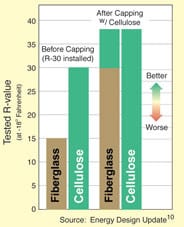Some insight on R-value
The R-value of insulation is a measurement of thermal resistance. In other words, R-value tells you how easily heat will move from one side of an object to the other. Even before applying insulation, the materials that make up your home have an R-value though not high enough to offer sufficient insulation properties in extreme temperatures like southern Louisiana.
The solid wood planks that provide the structure of your home offer an R-value of about 1. Your drywall has an R-value of about .45. Even your siding and sheathing have R-values.
However, if you’ve ever been in a home with no insulation at all, it becomes quickly clear that these miniscule measurements of R-value are not sufficient to offer comfort or energy savings. That’s why the cost of spray foam insulation will actually result in financial savings over time.
A variety of insulations exists, each with their own benefits. Fiberglass batting is the cheapest insulation. It has an R-value of 3.14 per inch. While this isn’t a bad deal, fiberglass batting is susceptible to mildew, mildew, and air flow, and it makes an ideal nesting environment for pests.
Closed cell spray foam is on the other end of the spectrum as is open cell spray foam. Closed cell has an R-value of 7.1 per inch, and it is water-tight and pest-resistant. Due to closed cell’s 2lbs per square inch density, it is more expensive to install.
We don’t recommend closed cell in attics as it would make it impossible to detect leaks if they should occur. Instead, open cell, with a density of .05 per square inch, is a better solution for Louisiana attics. We use 5.5″-7.5″ depending on the application.
Our pick for greatest R-value value is cellulose insulation.
Blown-in cellulose insulation offers many of the benefits of costlier insulation at an affordable rate. With an R-value ranging from 3.21 per inch in attics and 3.70 in walls. Cellulose insulation provides competitive thermal resistance, and its consistency means that it can fit any nook or cranny. In other words, cellulose insulation provides air sealing as well as insulation.
Cellulose insulation is made from post-consumer recycled newsprint. Homeowners who invest in cellulose insulation can rest assured that they’ve also made the energy-wise decision. In fact, using this highly efficient, eco-friendly insulation qualifies some homeowners for utility rebates.
To increase cellulose’s value, the strands are treated to make them more resistant to pests, fires, and mildew and mildew. Cellulose works hard for your money.
If you’re a homeowner who wants to improve your home’s energy efficiency, increase its thermal resistance, and lower utility bills without having exorbitant up-front costs, give Sunlight Contractors a call today. We’ve got even more information on affordable, efficient cellulose insulation.
CALL TODAY!
No other energy solutions provider can offer the savings and services that Sunlight Contractor does. From evaluations and estimates to energy conservation and production, we’re your one-stop shop for energy efficiency. Call or email Sunlight Contractors today to learn more about energy solutions that will save your business money while conserving energy.
We provide service to the following areas: New Orleans, Baton Rouge, Metairie, Slidell, Kenner, and surrounding areas including Marrero, Harvey, Mandeville, LaPlace, Covington, Gretna, Destrehan, Lacombe, Saint Rose, Madisonville, Norco, and more.

